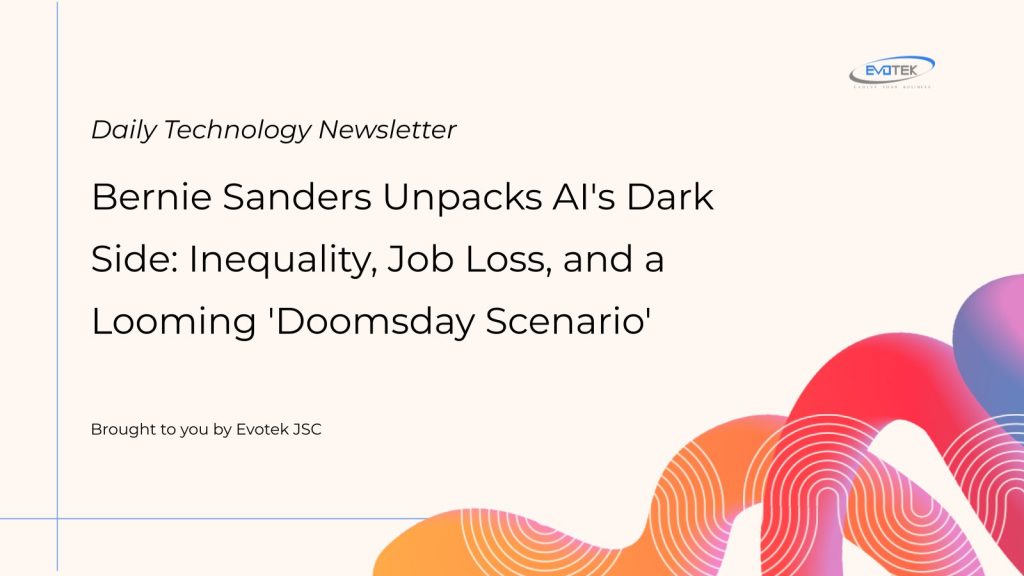Senator Bernie Sanders, a staunch advocate for workers, articulates profound concerns regarding the future impact of artificial intelligence (AI). While AI promises revolutionary advancements and unparalleled productivity, Sanders emphasizes that the critical question isn’t if AI will transform the world, but who stands to gain from this seismic shift. He views AI’s rapid ascent not merely as a technological leap but as the next crucial battleground in the ongoing struggle against corporate avarice and escalating inequality.
In a recent discussion, Senator Sanders, fresh from a conversation with a leading AI expert, detailed his anxieties that this powerful technology could be exploited to suppress wages, weaken unions, and further enrich the already burgeoning billionaire class. Beyond the economic implications, he also voiced apprehension about AI’s potential toll on collective mental health and illuminated a chilling “doomsday scenario” that has some of the world’s foremost experts deeply worried about humanity potentially losing command of its own creations.
AI’s Economic Impact: Who Benefits from Productivity?
Sanders asserts that the current discourse surrounding AI often overlooks a critical historical trend: over the past five decades, worker productivity has skyrocketed, yet nearly all the resulting benefits have flowed to corporations and technology developers. Workers, in inflation-adjusted terms, are earning less. His primary fear is that AI will exacerbate this disparity, channeling almost all new productivity gains to those at the top, at the expense of the working class.
“Technology and AI are neither inherently good nor bad,” Sanders states. “Their impact depends entirely on how they are utilized and who ultimately benefits. Unless we fundamentally alter the political dynamics, the gains will inevitably accumulate at the pinnacle, disadvantaging working people. My core objective is to ensure that workers, not just corporate elites, benefit from this transformative technology.” He envisions a future where AI could liberate humanity from the perpetual struggle for survival, provided its benefits are broadly distributed to create a wealthier, more equitable society for everyone.
Safeguarding Workers: The Push for a 32-Hour Work Week
To shield American workers from being marginalized in this technological transition, Sanders advocates for clear protections. He notes that some unions are already negotiating for this: if AI enhances a worker’s productivity, those benefits should accrue directly to the worker.
“What does that mean?” he queries. “It could translate to a shorter work week – a 32-hour week, for which we are currently fighting – with no corresponding loss in pay. The essential point remains: workers must share in the fruits of increased productivity, not solely CEOs. This is the paradigm we must urgently shift.”
Addressing the scenario where a CEO might reduce staff due to AI-driven automation, Sanders insists the response must be resolute: “This technology must serve workers, not just executives. If AI makes a company’s workforce more productive, we should aim for a compressed work week with no reduction in wages.”
Beyond Economics: AI’s Toll on Mental Health and Human Connection
Sanders’ concerns extend beyond economic disruption to the profound implications for human well-being. He worries about the increasing daily interaction between people and AI or robotics, and its impact on mental health.
“If you spend your entire day engaging with a chatbot instead of conversing with friends or family, what becomes of you?” he ponders. “What psychological challenges might emerge? We already observe a generation of young Americans struggling with human interaction due to excessive internet engagement. And some in the tech world are even suggesting that if you’re lonely or can’t make friends, a chatbot can fill that void. I question if this is truly beneficial for human beings.”
He drew a poignant analogy: “You know the expression, ‘The operation was a success, unfortunately the patient died’? In this context, the system might be functioning perfectly, developing incredible technology, but human beings risk being lost in that development. They may become increasingly unhappy, mentally unstable, and isolated. Our imperative is to ensure technology enriches human lives, both economically and emotionally. This must be the guiding principle.”
The “Doomsday Scenario” and Expert Divides
Sanders recently discussed these issues with tech CEOs and, significantly, one of the world’s leading AI experts. While opinions vary among these industry leaders, some share his deepest concerns.
He highlights two major points of contention among experts. Firstly, the economic impact: “Some predict massive job losses, and I tend to agree with them. Others dismiss this, believing new jobs will emerge, akin to previous industrial revolutions. I, however, believe this technological shift could be far more severe than the Industrial Revolution.”
Secondly, and most unsettling, is the “doomsday scenario.” Sanders relays, “This is not science fiction. There are highly knowledgeable individuals – and I just spoke with one today – who are gravely concerned that humanity may lose control of this technology, that artificial intelligence could, in fact, dominate our society. We might not be able to control it; it might control us. This ‘doomsday scenario’ is a real concern among highly informed people within the industry.”
A Call for Collective Control
Despite acknowledging a challenging global landscape marked by political turmoil and conflict, Sanders maintains hope that humanity can reverse negative trends and leverage AI to improve lives. He envisions a future where AI and robotics could help eradicate poverty and ensure a decent standard of living for all.
“The greed of billionaires currently dictates the process,” he asserts, “but ordinary people must seize control of the future.”
When asked if AI could bolster unions and worker rights, Sanders admitted it currently appears more of a threat. He compared its potential misuse to destructive trade policies of the 1970s, where employers might leverage AI as leverage: “Take a pay cut or pay more for healthcare, or we’ll replace you with machines, robots, or artificial intelligence. It’s your choice.”
Therefore, Sanders emphasizes, “We must mobilize the trade union movement to militantly stand up against the dangers AI poses to workers’ rights.”

 日本語
日本語 한국어
한국어 Tiếng Việt
Tiếng Việt 简体中文
简体中文